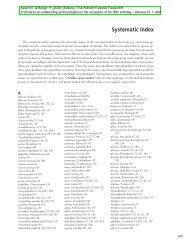abstracts der vorträge und poster - Technisches Büro für Ökologie
abstracts der vorträge und poster - Technisches Büro für Ökologie
abstracts der vorträge und poster - Technisches Büro für Ökologie
Erfolgreiche ePaper selbst erstellen
Machen Sie aus Ihren PDF Publikationen ein blätterbares Flipbook mit unserer einzigartigen Google optimierten e-Paper Software.
Mathieu, Francine, WasserKluster Lunz <strong>und</strong> Universität Wien, francine.mathieu@univie.ac.at<br />
Kainz, Martin, WasserKluster Lunz, martin.kainz@donau-uni.ac.at<br />
DOES PLANKTON SIZE MATTER? – THE ROLE OF PLANKTON SIZE FOR PREDICTING<br />
TROPHIC LEVEL AND THEIR ESSENTIAL NUTRIENTS OF ARTIFICIAL LAKES<br />
We study food web dynamics of selected artificial lake systems (i.e., gravel pit lakes) and hypothesize<br />
that trophic transfer of essential nutrients, as measured by essential fatty acids (EFA), follows that of<br />
food webs in natural lakes. This hypothesis is based on the assumption that phagotrophic organisms<br />
such as zooplankton will regulate their dietary nutrient retention according to their somatic<br />
requirements, which are, in large, not predicted by dietary supply. Our artificial lake systems receive<br />
their water and most of their nutrients from gro<strong>und</strong> water and are most often eutrophic in their trophic<br />
status and poor in EFA supply. Preliminary results indicate that the planktonic food web differs<br />
among the examined systems and is predominantely composed of cyanobacteria and zooplankton<br />
(mostly cladocerans), as macroplankton (>500 um). Ongoing analysis of trophic level and EFA<br />
composition of organisms evaluates the transfer of essential nutrients at the aquatic plant-animal<br />
interface of these aquatic food webs. Results will be discussed with respect to trophic transfer<br />
concepts of planktonic food webs of natural lakes.<br />
Melcher Andi, IHG - Institute of Hydrobiology and Aquatic Ecosystem Management, BOKU, Wien,<br />
andreas.melcher@boku.ac.a<br />
Schmutz Stefan, IHG - Institute of Hydrobiology and Aquatic Ecosystem Management, BOKU, Wien,<br />
stefan.schmutz@boku.ac.at<br />
CLIMATE CHANGE IMPACTS ON FISH IN AUSTRIAN RIVERS<br />
Water temperature is amongst other factors a driver of fish community composition in rivers. Climate<br />
change and local human impacts can warm water bodies and cause changes of its fish fauna.<br />
In this paper the methodological strategy is (1) to use observed water temperature data from 1976 to<br />
2005 to develop multiple linear regression models and to predict water temperature from abiotic<br />
parameters. Three variables, altitude, mean monthly flow rate, and distance from the source, described<br />
up to 80% of the variance of mean water temperatures during summer.<br />
Furthermore (2), we evaluate the impact on fish communities using ecological models driven by water<br />
temperature. The models were significantly correlated with fish assemblages and typical temperature<br />
ranges could be assigned to the river regions. Analyses of water temperature timelines showed a<br />
warming trend over the last 30 years. Our results should improve the un<strong>der</strong>standing of how climate<br />
change may alter the structure and functioning of freshwater ecosystems in Austrian rivers.<br />
21



